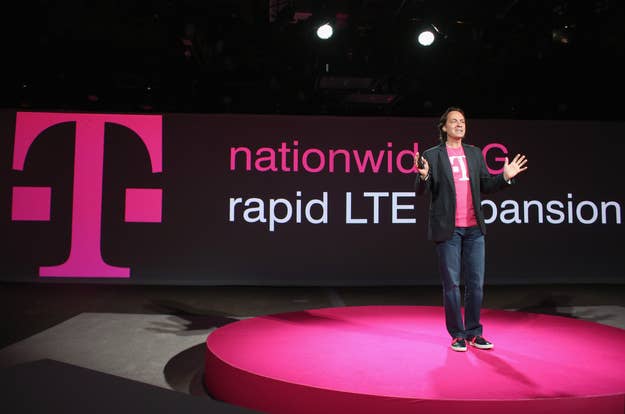
Exciting news from T-Mobile today! At least, I think? "We've upgraded upgrades," the company's site says, with "a revolutionary new upgrade program."
The new program, called "Jump," lets customers upgrade their phones "twice every 12 months." T-Mobile says that "existing customers can get the same great phone prices as new customers." I've been writing about smartphones for as long as I've owned one, yet this announcement just won't sit still in my brain; it's slippery and confusing, with just enough detail to be compelling but not quite enough to make sense.
Well, let's see what the tech blogs are saying. In a serviceable report, The Verge, a truly great site, says this of the plan: "For $10 per month, customers will be able to upgrade their phones up to two times per year." It also says, "You'll need to wait six months until you're eligible for your first upgrade." The post notes that this is an "improvement" over "existing phone insurance plans," and mentions a secondary announcement about "unlimited talk and text with 500MB of full-speed data per month" on a family plan. (Not to single out The Verge: Here are similar posts from Gizmodo, Engadget, CNET, PC Mag, and Ars.)
Let's tally the jargon. Setting aside T-Mobile's official made-up terms — "un-carrier," "Jump," and the name of the event, "boldest moves yet" — casual cellphone English has been replaced substantially with words of carriers' own choosing: upgrade, plan, eligible, talk and text, unlimited, flexible, subsidy, full-speed. All of these words have multiple meanings in many different contexts, and many are in the context of wireless carriers trying to sell us things.
These meanings are meant to be advantageous for the carrier, not for the customer: "Unlimited" plans are unlimited until a carrier says they aren't; an "upgrade" happens after a certain period of time, whether or not anything about the experience is up a grade; carriers have somehow elevated themselves to a place from which they can designate customers as "eligible"; and a system by which you pay for a phone slowly, over years instead of all at once, has been rebranded as a "subsidy."
Every wireless carrier should be expected to talk like this — they're far from the only industry to recalibrate the meaning of "upgrade" or "unlimited" for their own benefit. They employ people who do this all day: Almost every major company does. But customers, and the press, don't have to play along, and they shouldn't. Twenty years of practice has left customers literate enough in this jargon that wireless companies feel comfortable using it all the time, which is how we end up with word groupings like, "Upgrade to the latest smartphones twice every 12 months. Not once every two years," from a company in the middle of an image makeover predicated on the idea that it's simplifying the inherently simple process of paying to use a phone.
It's best to think of this bizarre language in the same way you'd think of your cellphone plan contract itself: as intentionally misleading, used in the hope that you'll 1) pay money to the company, and 2) pay more than you have to, often by accident. This is language meant to deceive, and should be treated as such. It's fine print writ large.
So, again, exciting news from T-Mobile today! Soon, in addition to giving your cellphone company money every month in exchange for the use of a phone and wireless connection, as well as spending a couple hundred dollars more every two years to get a newer phone, you can spend more money each month but get a newer phone more often. Got it?
Wireless companies operate within antitrust law but only just; they lock people into contracts that they don't understand; they tell you about shocking overages only when it's too late. They're already at an advantage. Don't let them tell you how to talk too.
